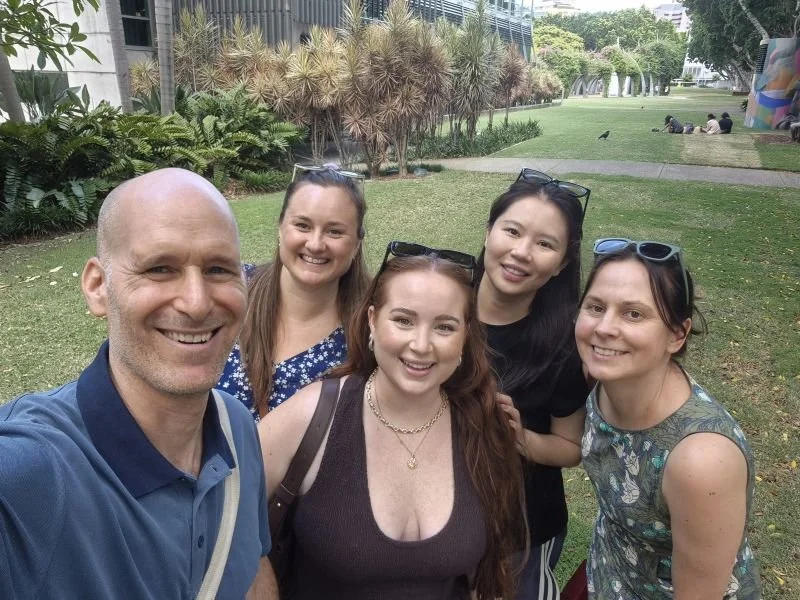Dr. Carmel McDougall (D.Phil) - Principal investigator
Carmel is a molecular biologist with an interest in functional, evolutionary and ecological genomics, particularly of marine invertebrates. Her primary research has been in the field of molluscan biomineralisation, with a focus on identifying the genes involved in controlling shell synthesis, understanding how these genes have evolved, and investigating how variation in these genetic factors leads to differences in shell (or pearl) properties. Carmel enjoys using comparative and functional genomics and experimental studies to provide practical outcomes for sustainable aquaculture and marine conservation, and to shed light on the evolution of the amazing repertoire of organisms found within our oceans. She also enjoys teaching on the topics of Zoology, Genetics, and Evolutionary Biology.
Carmel obtained her BSc (Hons) at the University of Queensland. Following this, she undertook her D.Phil at the University of Oxford (spending her final year at the University of St Andrews) in the UK, investigating the evolution and development of polychaete worms under the supervision of Dave Ferrier. Carmel’s postdoctoral work brought her back to UQ where, in Bernie Degnan’s laboratory, she applied genomic and bioinformatic techniques to improve the quality of the South Sea Pearl and undertook studies into the evolution of molluscan biomineralisation. In 2017 Carmel moved to Griffith University to establish her research laboratory. She initiated new collaborations with the rock oyster industry, using her Advance Queensland Fellowship to apply functional molecular approaches to challenges currently encountered during hatchery production and farming of these oysters. She is currently applying this knowledge to support various shellfish reef restoration projects.
In 2023 Carmel moved back to the University of St Andrews to continue to build her research group and explore new research directions.
Brett Bolte (Honours) - PhD Student
Brett is an American student who started his studies at the University of Tampa until he went on exchange at James Cook University where he then graduated with both his BSc in Marine Science and Honours in Marine Biology. Throughout his time at JCU Brett helped with several projects at the Australian Institute of Marine Science (AIMS), specifically, assisting research understanding the life cycle of Acropora eating flatworms. It was during his honours project that he developed a passion for environmental DNA (eDNA). The topic of his thesis was the validation of eDNA as a method to detect the presence of deadly cubozoan jellyfish, where he developed species specific eDNA assays for four jellyfish species.
His PhD research will focus on exploiting filter feeding bivalves as a natural eDNA sampling medium to determine the presence of some of the most crucial pathogens, including algal and bacterial blooms and parasites (including amoeba), in the Tasmanian aquaculture industry. This research is poised to identify a natural and continuous method of sampling to prevent and monitor outbreaks of disease within aquaculture stock using one of the most common biofouling species. Brett’s PhD will be completed at CSIRO (Hobart, Tasmania) with funding from the Blue Economy CRC and Griffith University’s International Postgraduate Research Scholarship.
Nathaniel Crook (Honours) - PhD Student
Nathaniel is a British student who completed his BSc with Honours in Marine Biology at the University of Aberdeen, with an exchange year across the pond at the University of Calgary. Throughout his undergraduate time, he involved himself in multiple research projects at the School of Biological Sciences in Aberdeen. These ranged from aiding the generation of comprehensive DNA barcode references libraries for Scottish seagrass beds, to investigating epigenetic and epi-transcriptomic mechanisms associated with the complex behaviour of single celled slime moulds. His honours project was where he was able to compile his ecological genomic interests and skills, to develop a project investigating epi-transcriptomic mechanisms and the genetic architecture of the Beadlet Anemone, Actinia equina.
His PhD will focus on how environmental and genetic factors drive the iconic patterns of the blue-rayed limpet (Patella pellucida). He aims to combine advanced imaging techniques and spatial transcriptomics to investigate the molecular and cellular drivers of shell patterning. He hopes it will provide insights into the molecular basis of pattern formation and how environmental cues influence phenotypic plasticity. Nathaniel’s PhD will be completed at the Scottish Oceans Institute and was awarded a University of St. Andrews School of Biology Scholarship to complete his PhD under Dr. Carmel McDougall.
Nathaniel, as an avid diver, is primarily focused on marine organisms with a speciality for invertebrates and their unique genomic mechanisms.
Maille Mansbridge - Honours Student
Maille is a 4th year student currently at the University of St Andrews and working on her research project for a BSc in Marine Biology. Maille has worked on several different evolutionary-development studies at Caltech, including most recently work on the impacts of microbiome modulation on jellyfish regeneration.
Maille’s honours project will focus on differences in gene expression between European flat oysters collected from locations with varying levels of ocean acidification. The project will specifically focus on the changes in expression for genes correlated with shell formation and calcification.
Jackson Banner Robinson - Honours Student
Jackson is a 4th year student currently at the University of St Andrews and working on his research project for a BSc in marine biology. Jackson has a hand in several conservation projects at St Andrews, including a vertically integrated project (VIP) that aims to monitor and quantify the biodiversity present on University managed land in St Andrews.
Jackson’s honours project will focus on biomineralising marine annelid species to determine how their rate of settlement is affected by external stressors such as temperature. The project will also focus on how annelid calcification is affected by external stressors.
Mollie Stefanek (B.Mar.Sci - HONOURS) - PHD student
Mollie graduated from Griffith University with a Bachelor of Marine Science, majoring in Marine Ecology, in 2020. Within this degree, she had the opportunity to complete a capstone project based on comparing freshwater macroinvertebrate traits with stream properties across southeast Queensland to help predict species’ vulnerabilities to environmental changes.
Mollie then completed a Bachelor of Science (Honours) with Dr Carmel McDougall at Griffith University and received 1st class honours. This project focused on the potential links between pigmentation and innate immunity of Sydney Rock Oysters in the Richmond River. This project included the exploration of genes that could be associated with immunity within molluscs.
Mollie was awarded a University of St. Andrews School of Biology Scholarship and a Handsel Tuition fee Scholarship to complete her PhD in Scotland. She is fulfilling her PhD under the supervision of Dr Carmel McDougall and Dr Ido Bar. This study looks to investigate self-non-self-detection in oysters. It explores whether self-recognition occurs within these species and, if so, how genetically different the material needs to be to elicit a reaction. This study also searches for differing recognition levels throughout different tissue types, explores gene expression related to self-recognition and compares recognition responses with disease detection responses. The aim is to explore a little-known part of mollusc biology and build the base knowledge for further investigation into transmissible disease research in molluscs.
Mollie’s interests include species survivorship, comparing species adaptations to environmental changes, marine invertebrates, and immunity genetics.
Dr. Crystal Tang (MSc, PhD) - Postdoctoral Researcher
Crystal is a postdoctoral researcher under Dr. Carmel McDougall at the University of St Andrews. Born and raised in Hong Kong, she completed her Bachelor of Science in Molecular Biology and Biotechnology at the University of Hong Kong. She then earned a Master of Science from Osaka University in Japan, where she investigated the association of heterochromatin and RNA:DNA hybrid formation in suppressing chromosomal rearrangements at centromeres in fission yeast. Crystal obtained her Doctoral degree from the School of Life Science and Technology at the Tokyo Institute of Technology (now Institute of Science Tokyo). Her doctoral research focused on allorecognition (self/non-self recognition) in hydrozoan jellyfish Cladonema radiatum.
In her current project, she explores allorecognition in bivalve molluscs, investigating the molecular and genetic mechanisms of allorecognition in various bivalve species. Her work aims to deepen the understanding of the relationship between allorecognition and the evolution of transmissible cancer.
Ya Zhang (M.SC) - PHD student
Ya completed her B.Sc in aquaculture and M.Sc in marine science at Shanghai Ocean University (China). Her M.Sc research investigated the effect of nitric oxide on the metamorphosis and immunity of Mytilus coruscus (Mussel). Because of her passion for the aquaculture industry, she worked at a Shellfish culture company before starting her Ph.D.
Her Ph.D. work mainly focuses on the prevention of maturation to improve the resilience and growth of the Australian greenlip abalone. She will revise and improve the method of producing triploid abalone, and further differentiate the molecular pathways related to maturation and growth. This will enable the development of intervention methods that impact gonadal maturation without producing negative growth outcomes. This research is under the supervision of Dr. Carmel McDougall, Dr. Ido Bar from Griffith University and Natasha Botwright from CSIRO Agriculture and Food.
PAST LAB MEMBERS
Dr. Clarissa Molinari
Philip Trompke
Dr. Nikolina Nenadic
Madeleine Toomey
Felix Hunter
Dr. Julieta Gamboa Cutz
Dr. Nathan McIntyre
Dr. Marina Richardson
Dr. Jonathan W. Lawley
Dr. Lorelle Stanisic
Dr. Kimberly Finlayson
Dr. Ali Shokoohmand
Dr. Tessa Page
Brenton Bodley
Join the lab!
Enquiries from potential HDR (PhD and Masters) and honours candidates that are interested in joining the lab are welcome. Please contact Carmel to discuss potential projects and opportunities. Note that these applications are competitive and potential applicants should have evidence of relevant research experience.
A number of fellowship opportunities are available for postdoctoral scientists. Interested candidates should contact Carmel by email with an introduction to your background and research interests, a brief outline of the proposed project, and a description of how the project is aligned with the research focus of the lab.











